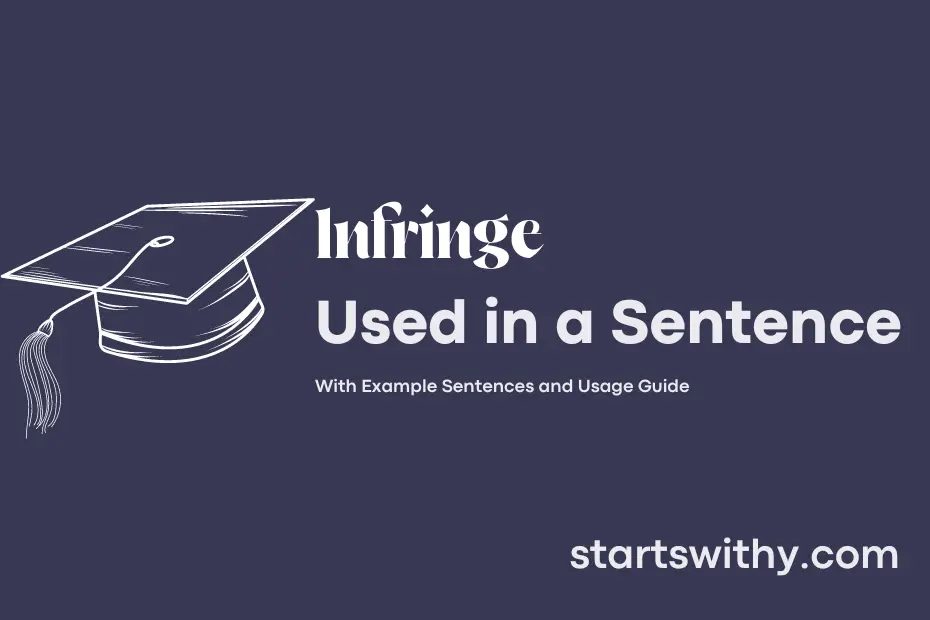Have you ever wondered what it means to “infringe” on someone’s rights or property? In simple terms, to infringe is to violate or trespass upon something that belongs to someone else.
Essentially, when you infringe on something, you are encroaching on a person’s rights, boundaries, or possessions without their permission. This can refer to actions that breach laws, contracts, copyrights, or any other regulations meant to protect an individual or their property.
7 Examples Of Infringe Used In a Sentence For Kids
- Be careful not to infringe on your friend’s turn to play with the toy.
- It is important to ask before you infringe on someone else’s personal space.
- Remember to respect other people’s belongings and not infringe on their property.
- Sharing is caring, so make sure not to infringe on others’ opportunities to play.
- Always be polite and ask permission before you infringe on someone else’s activity.
- Kindergarten students should understand that it is not okay to infringe on someone else’s rights.
- In class, make sure to raise your hand and wait your turn to speak, so you don’t infringe on others.
14 Sentences with Infringe Examples
- Infringing on someone’s study space by being too noisy in the library is disrespectful.
- It is important to cite sources properly in your research papers to avoid infringing on intellectual property rights.
- Infringing on someone’s personal space by constantly borrowing their belongings without permission is not cool.
- Plagiarism is a serious offense that can infringe on academic integrity policies.
- Using someone else’s work without giving them credit can infringe on copyright laws.
- It is crucial to respect copyright laws and not infringe on others’ creative rights.
- Cheating on exams can infringe on academic honesty policies and lead to severe consequences.
- Copying someone else’s homework assignments infringes on the spirit of learning and personal growth.
- It is essential to be aware of the different ways in which we can infringe on ethical guidelines set by academic institutions.
- Engaging in activities that infringe on campus rules can result in disciplinary actions from the college authorities.
- Posting inappropriate content on social media can infringe on the college’s code of conduct.
- It is important to be mindful of the impact our actions can have on others and to avoid infringing on their rights.
- Using unauthorized study materials can infringe on academic honesty policies.
- Sharing confidential information with unauthorized individuals can infringe on data privacy regulations.
How To Use Infringe in Sentences?
To use Infringe in a sentence, first, identify a situation where one person or group is violating the rights or privileges of another. For example, you could say, “The company was found guilty of infringing on the artist’s copyright by reproducing their artwork without permission.”
Next, when constructing your sentence, make sure to place the word Infringe in a position that clearly conveys the act of violation. It is typically followed by the preposition “on” or “upon” and then the right, privilege, or territory being violated. For instance, “The new law will make it illegal to infringe upon citizens’ freedom of speech.”
Remember to use Infringe in a formal or legal context to accurately convey the idea of crossing boundaries or limits. Avoid using it in a casual conversation where a simpler term like “violate” or “break” would suffice.
Keep practicing incorporating Infringe into sentences to become more comfortable using it naturally. Over time, you will gain confidence in your ability to express the concept of infringement accurately and effectively in writing or conversation.
In summary, learn to recognize situations where someone’s rights or boundaries are being violated, place Infringe appropriately in your sentence, use it in a formal context, and practice using it to improve your language skills.
Conclusion
In conclusion, it is essential to be aware of the consequences of infringing on intellectual property rights. Engaging in activities that involve using someone else’s work without permission can lead to legal action, penalties, and damaged relationships. Whether it be copying a design, using copyrighted material without authorization, or plagiarizing someone’s work, individuals and businesses must respect the intellectual property of others.
By understanding and respecting intellectual property rights, individuals and businesses can protect their own creations and foster a culture of creativity and innovation. It is important to always seek permission and give credit where it is due to avoid infringement issues and ensure a fair and respectful environment for all creators.



